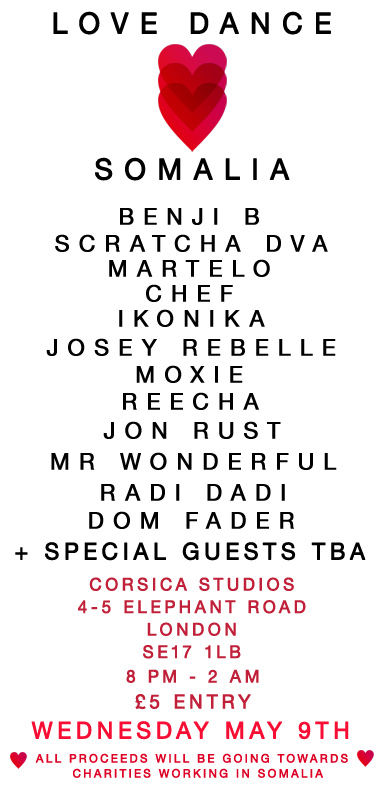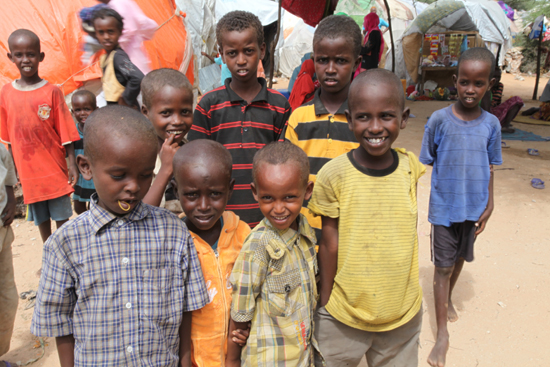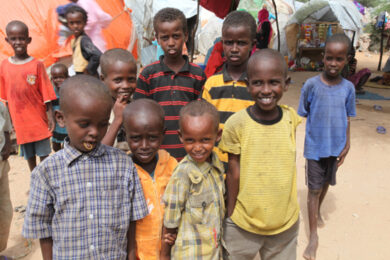If you’re about tonight in London and fancy getting your dancing shoes on for a good cause, head across to Corsica Studios, Elephant & Castle, where Love Dance will be raising money for charities working in Somalia. The team behind the night – including Quietus scribe Melissa Bradshaw – have assembled a mightily impressive line-up of names for the event, including Hyperdub’s Scratcha DVA and Ikonika, BBC Radio 1’s Benji B, Chef, Martelo, Reecha, Josie Rebelle and more. Entry is £5, with all proceeds going directly towards charities working to combat the famine in Somalia. See the flyer below.
During the night, signed Hyperdub, Hessle Audio and Planet Mu goodies will be on sale to raise extra funds, as well as three white label copies of Burial’s first album and rare first 12” single (both released through Hyperdub). Story continues below flyer.

In advance of tonight’s event, Melissa has written more about the rationale behind it, and sat down to speak to the UK Ambassador to Somalia, Matt Baugh, about the problems the country faces:
“Tonight my friend Zainab Jama and I have organised a club night to raise money for charities working in Somalia, where much of the worst of last year’s famine, the first of the 21st century, was concentrated. Fifteen DJs are playing for us, and as you will see our line-up is drawn from the cream of what people refer to these days as the UK bass scene. Apart from saying that Zainab and I have a lot of brilliant and very talented friends, I think this says a lot about how much people in that community – a soundsystem culture – are willing not just to help raise money, but also to show solidarity, for people in circumstances infinitely less comfortable than their own.
We called it Love Dance because it’s about showing some love, and we made a mix tape of Somali music, to celebrate Somali culture – listen below. This was originally going to be a radio show and we had to get it together for the internet very last minute, so forgive us for the temporary of track names. I’m not just saying this, but I’ve barely listened to anything else since we put it together. (The mix is by Dr Beatjama – we received some technical support from our friend Mr Beatnick). If you are feeling the dearth of the sun so far this May, trust me – it will help.
You may also be interested in the fact that we have three white label copies both of Burial’s first album and his first single (also the first release on Hyperdub) for sale (there will be bidding), as well as various signed Hyperdub, Planet Mu and Hessle Audio goodies.
People keep asking me why I’m doing this. I could go into the history of my superego, like the fact I was raised by two documentary film-makers who work on global development and environment issues, but I won’t: what I want to point out is the related link between soundsystem culture and showing some love for other people. That’s at a time when I’ve twice noticed soundsystem culture entering the mainstream media in the UK in the last year in a negative context: as part of an attempt to measure what’s wrong with young people in our country today.
Yes, I’m talking about the riots last year – the right wing media was quick to blame them on hip hop culture, a descendent of soundsystem culture. I’m also talking about a recent survey conducted by The Guardian and Mixmag, which focused on the link between reckless and self-indulgent drug use and club culture (‘those who defined themselves as clubbers were more likely to take ecstasy than smoke cigarettes’, stated The Guardian, and one respondent said ‘when I go out […] I just want to lose myself for a few hours’).
There’s so much to be thought and said about what’s happened to soundsystem culture, the fact that the Guardian/Mixmag survey apparently focused on white and middle class people, how ‘hoody’ and ‘young inner city black male’ function as as the racial/class constructions of politics and the media, that I can’t go into here. I just want to stress for now that neither of these snapshots fully correspond with my experience of soundsystem culture. Yes, I’ve seen a lot of drug use and yes, I do think a small minority of young people might aspire to certain types of behaviour because they identify with rap stars, but these are partial aspects of a larger phenomenon. Soundsystem culture and dance music are not just about self-indulgence and narcissism, or simply reflections of the political functioning of race and class. It’s about a collective experience that goes beyond that. And I think it’s precisely that experience that has a meaning that is something like showing love for other people all over the world who do not deserve to suffer as the objects of political functions.
After I decided to organise this event, I studied the media coverage of Somalia, including of the recent London Conference on Somalia. Why was this happening now, I thought? Why when the Famine Early Warning Systems Network had given warnings as early as 2010 had the famine still happened? Why did the list of aims of the London conference put security in front of the humanitarian crisis? Why was the famine only in the media once it had already happened? Why the apparently sudden interest by the UK in Somalia? Are East Africans only recognised in the West when they are victims, or when they are dying?
I decided the thing to do was to ask the recently appointed UK Ambassador to Somalia (the first in twenty years), Matt Baugh, who kindly sat down with me last week. Here is some of what he told me.
As to why the British Office to Somalia was established (in the spring of 2010), he talked of a ‘procession of
failure’ of Somali politics and international politics in relation to Somali, and stated:
Matt Baugh: "What is I think for me the most persuasive issue for why we see the British Government and a number of
others now re-engaging on Somalia and [is] the humanitarian crisis. And all you have to do is look back at the
famine last year and see what is happening to ordinary Somali men, women and children. The first famine of
the 21st century, the first famine in the Horn of Africa for two decades. In a region where drought is endemic:
so drought happens. But famine only occurred really in southern Somalia, and that’s because of the prevailing
conditions, what is happening with coping capacity, how communities continue to suffer, conflicts, insecurity,
an inability to cope, livestock, pasture, access to water, all of that then starts to fall in on itself. Famines are systemic, they happen because of systems collapsing, and what we saw last summer was that wholesale
collapse in southern Somalia. […] Somalia becomes too important to ignore in this day and age. It matters to
UK national security? Yeah, absolutely. […] You can’t simply ignore Somalia, you can’t simply try and contain
the threat coming from Somalia. If we want to try and make Somalia more stable, predominantly for the people
of Somalia, we have to engage. We have to engage not just with the symptoms but also with the causes."
About the apparent failure to act on early warning signs (recently the subject of a report by Oxfam
International and Save the Children):
MB: "I fail to accept that we could not have done better. Of course we could, we absolutely all could have done
better, too many people have died for us to say ‘no, it was okay’. Clearly not. Opportunities were missed, we all
could have done better. […] But we have to understand the context – this is a one off – I struggle to think of a
more complex, more dangerous, more challenging operating environment than this one and I take my hat off to
those humanitarian organisations and NGOs that have been able to deliver in southern Somalia."
On the response by Somali people to the current British effort there:
MB: "People may not necessarily agree with all of our policy choices, but what they say is it’s good to have the
British involved."
On plans to move the embassy from Nairobi to Mogadishu:
MB: "The Foreign Secretary has gone on the record that we intend to reopen our embassy in Mogadishu when
conditions allow […] my intention is absolutely clear and that’s to be in Somalia, talking to Somalis as often as
we can for as long as we possibly can."
Explaining how the British effort in Somalia will work:
MB: "We can’t do our job by simply imposing a set of ideas, it’s about Somali leadership and supporting Somali
leadership in all its facets. […]
"Not only have we (the British Government) I think galvanised international effort – we’ve also provided I think
£180 million, since July of 2011, in Ethiopia, Kenya and Somalia, in order to ensure that where it’s possible to
reach vulnerable Somalis either in the country or living out of the country, we can do so. […]
"The only route to a sustainable solution in Somalia is political, and that needs to be done at a number of levels.
There needs to be a greater focus on helping consolidate and support local communities to recover from the
famine, the drought, become more resilient to drought, in that process starting to knit together local level
political agreements that de-escalate the level of violence and conflict – which is often largely about resources,
access to water and access to pasture – so knit those agreements back together again, provide a basic level of
security, rule of law, policing to ordinary people so they feel that they are secure. From there look to build
up towards some sort of regionalised set of agreements – what is Somalia going to look like in the future –
and at the same time try to see whether it’s possible to support a national political process that looks across
the country and tries to bind these units and agreements together. So it’s only as part of a political process
that we’re going to help Somalis and Somalia become more stable. This isn’t about some sort of Western
intervention or the West saying ‘this is the answer’, it’s saying ‘we want to help you determine what that process
looks like’."
On visiting places that have been affected by the famine:
MB: "Mogadishu is becoming a haven for people seeking refuge, seeking safety, the very real challenges of trying to
deliver support to really vulnerable women and children in that city. As you fly in you see the camps, you see
the tents, you see these IDP (internally displaced person) displacement areas, they’ve really grown in the course
of the past year because people have decided to move into Mogadishu because they think that’s where support
is going to be provided. Then the challenges then of meeting that in terms of ensuring that assistance can be
delivered, are huge. Even in Mogadishu, it remains a violent city. […]
"You only have to look at Dadaab, the refugee camp in northern Kenya, to understand the scale of it – half a
million people now in one area.[…] It is the third or fourth largest city now in Kenya.[…]
"I sat down with one mother who’d just arrived in Dadaab camp. She’d been walking for weeks and she had
to confess that she’d buried several of her children on the way. It’s absolutely heartwrenching, and then you
realise that – these cases are tragic, but it’s happening on a scale that’s – I mean, three thousand people a day
were crossing the border into Kenya and Ethiopia. A day. We will never know the full scale of the tragedy, but
that a famine can happen in the 21st century is unacceptable I think."
And as to the possibility of the current ‘humanitarian crisis’ turning back into a fully-blown famine:
MB: "We’ve bought it back essentially from the edge of the abyss, but depending on what happens, if we can’t
sustain that support, if the rains fail again, then it could easily move back. These are very very fragile, very
very weak coping capacities that we have to be really careful that this doesn’t move back the other way."
About the recent bombing by al-Shabaab [the Islamist organisation who control much of southern Somalia] of the new national theatre in Mogadishu, which killed the heads of the Somali Olympics committee and football association:
MB: "Everyone was surprised by that attack. But sadly it is becoming part of al-Shabaab’s new tactics. It’s
insurgency, it’s trying to instil fear, it’s trying to undermine a lot of what the political process currently stands
for. This was meant to be a celebration, the first anniversary of Somali
national television, and the opening of a national theatre – big cultural opportunities and events in the life of
both the city and a country that has suffered for two decades. And what do al-Shabaab do? They seek to blow
it up. Well I think that says more about them than it does about anything else. They have no consideration, no
desire to see some sort of stability in Somalia. […]
"I have every confidence that we’ll see Somalis in London, for the Olympics, hopefully competing. Certainly
they intend to be there and I think that says a lot about determination the Somali people, and their desire
to reclaim what is rightfully theirs, which is a stable country, hugely passionate about its culture, about its
identity, and prepared to take it forward."



